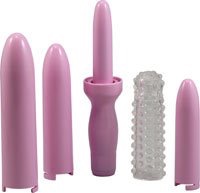Vaginal Dilators for Pelvic Floor Dysfunction
Dyspareunia or pain with intercourse can be caused by a number of sources. If you are having pain with intercourse, it is important to see your gynecologist or urogynecologist to discuss your symptoms and to undergo a pelvic exam to see what is causing your pain. Some common causes for pain with intercourse include vaginal dryness in post-menopausal women, pelvic organ prolapse, or pelvic floor dysfunction. Vaginal dryness is usually treated with vaginal estrogen. Pelvic organ prolapse (cystocele, rectocele and uterine prolapse) are often treated with vaginal or abdominal prolapse repair surgery. In the case of pelvic floor dysfunction (an over tightening of the pelvic floor muscles), the levator muscle that runs along the sides of the vagina becomes hypertonic or overly contracted. This can happen for several reasons but if untreated often becomes more painful with time due to a repeated tensing reaction with intercourse in anticipation of discomfort, which further tightens this muscle. This can be diagnosed on pelvic exam. Treatment for levator hypertonicity with associated symptoms often includes pelvic floor physical therapy or vaginal dilators. Vaginal dilators are available online and are an affordable option for performing relaxation therapy at home. We recommend the Dr. Berman Dilator set, as seen below.
Patients begin with the narrowest dilator size and slowly increase in size over time. This allows for a slight expansion and relaxation of the vaginal walls. The dilator is placed inside the vagina daily for 10-15 minutes a day. Use should never be painful. Using the stimulation helps to further relax the pelvic floor muscles. Dilators may be used in conjunction with or prior to intercourse. If patients are also undergoing pelvic floor physical therapy, they may use dilators prior to starting physical therapy or in conjunction with their sessions.
Got questions? Need an appointment? We’re here to help!
